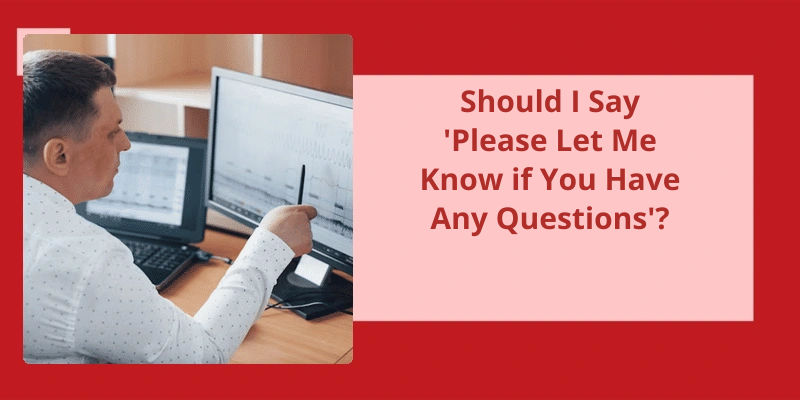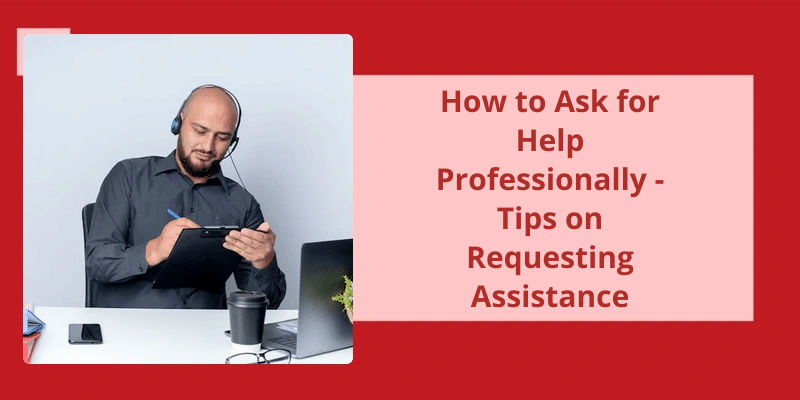Effective communication is an essential aspect of modern-day interactions. The use of polite and courteous language can go a long way in establishing positive relationships and fostering a sense of trust and respect between individuals. In formal email communication, the phrase "please let me know if you’ve any questions" is often used as a way of inviting the recipient to seek clarification or additional information if needed. This simple yet powerful phrase serves as a subtle reminder that the sender is available and willing to provide assistance to the recipient. While it may seem like a small gesture, expressing willingness to help can have a significant impact on the success of a conversation or business relationship. The next time you’re drafting an email, consider incorporating this phrase to ensure effective communication and a positive outcome.
How Do You Ask Politely Do You Have Any Questions?
Asking whether someone has any questions politely, is an essential business etiquette. It can showcase that you’re open to clarifying any doubts that your audience has, and it also removes any confusion or misconceptions that your message may have provided. However, asking politely is key, and there are various ways to phrase the question without coming off as dismissive or brash. One of the best ways to ask politely is by using phrases such as “Any further enquiries?” or “Let me know if you require further information.”
These phrases are great alternatives if you want to avoid sounding pushy and condescending. When you use them, it shows that you’re taking the initiative to clarify any doubts that your audience may have, but not forcing them to ask. This way, you can put them at ease easily and make them comfortable enough to ask without fear of feeling inferior or stupid. This also leads to better communication, as there won’t be any misunderstandings that can turn into bigger problems down the road.
Another great way to encourage people to ask questions is by letting them know that you’re available to answer any queries. A phrase like, “Im prepared to accommodate anyone picking my brain” goes a long way. It creates a safe environment where people feel comfortable seeking answers and helps build trust. By offering open communication channels, you can create an environment of collaboration and teamwork, which is essential in any business or organization.
These phrases demonstrate your willingness to connect with your audience, and it makes them feel valued. It’s also a great way to ensure that everyone is on the same page and that everyone understands the message that you’re trying to convey. It’s a simple yet effective way of fostering better communication and a healthier work environment.
Effectively asking whether someone has any questions is an essential part of business communication. The way you phrase the question matters, and can determine whether your audience feels comfortable speaking up or not. By letting people know that you’re open to answering any queries and accommodating anyone who wants to pick your brain, you create an environment of collaboration, trust, and open communication. Effective communication is key to achieving success, and learning to ask politely is an integral part of this process.
When it comes to communication in professional settings, it’s important to ensure that your tone is polite and respectful. If you’re wrapping up a presentation or conversation and want to encourage questions from your audience, there are a number of ways you might go about doing so. One common strategy is to simply ask if anyone has any questions, but there are also other phrases and strategies you might consider using to make your request for feedback more effective. Let’s explore some of these techniques in more detail below.
How Do You Politely Ask if You Have Any Questions?
When sending an email or giving a presentation, it’s important to make sure that your audience understands the topic being discussed. One way to do this is to ask if they’ve any questions. However, simply asking “any questions?” might come across as too direct or abrupt. To be more polite, try asking “Please let me know if you’ve any questions.”
By adding the word “please,” you’re adding an element of politeness to your request. This makes it more likely that your audience will feel comfortable asking questions if they’ve any. Using a friendly and approachable tone can go a long way towards making your audience feel at ease.
Another important aspect of asking if someone has any questions is to make sure they know how to reach out to you. If you don’t give them a clear way to contact you, it can be difficult for them to ask questions or get clarification. Consider including your email address or phone number in your message, or letting them know that they can approach you after the presentation.
It’s also a good idea to give your audience enough time to think of questions. For example, if youre giving a presentation, you might want to pause for a few moments after asking if they’ve any questions. This gives them time to process the information and formulate their thoughts.
Finally, it’s important to remember that asking if someone has any questions isn’t a one-time event. Encourage your audience to ask questions throughout the presentation or discussion, and let them know that youre open to feedback or further discussion after the fact. By creating an environment where questions are encouraged and welcome, you can help ensure that everyone has a clear understanding of what’s being discussed.
It’s always good to know the appropriate way to phrase a question or request, especially when it comes to communication in formal settings. One example is the common phrase “if you’ve any questions” versus “should you’ve any questions.” While both are acceptable, there are slight nuances that distinguish them in terms of formality and politeness.
Can I Say Should You Have Any Questions?
Asking if there are any questions at the end of a meeting, presentation, or conversation is a common practice in English-speaking cultures. It’s polite to give the other person the chance to ask any questions they may have before concluding the discussion. Using the phrase “should you’ve any questions” is a way to show that you’re open to further communication and willing to clarify any points that may not have been fully understood.
It indicates a level of formality that’s appropriate for these kinds of situations. When speaking with colleagues or friends, on the other hand, “if you’ve any questions” may be more appropriate. This phrase is less formal and more direct, reflecting the casual nature of the conversation.
Using “should” instead of “if” also adds a sense of politeness and respect to the conversation. It shows that you’re aware of the other persons potential need for clarity or additional information and are willing to provide it. Additionally, it can set a tone of friendliness and approachability, making the other person feel comfortable asking questions without fear of judgment or stigma.
It’s important to gauge the context and tone of the conversation to see if the phrase is appropriate.
Understanding the nuances of these phrases can help you communicate more effectively and confidently in a variety of situations.
Different Ways to Ask if There Are Any Questions
- Do you’ve any questions?
- Is there anything you’d like to inquire about?
- Do you need any further clarification?
- Would you like me to go over anything again?
- Are there any uncertainties or doubts you have?
- Can I assist you with anything else?
- Would you like more information or examples?
- Do any pressing concerns come to mind?
- Is there anything that’s still unclear?
- Are there any other details you need to know?
Conclusion
By inviting questions or comments, you create an opportunity for meaningfully engaging with your audience and ensuring that they’ve the information they need to fully understand your message. Whether you’re writing to colleagues, clients, or new contacts, make sure to include this phrase at the end of your correspondence to encourage constructive dialogue and strengthen your professional relationships.






